Since last year, when the patent expired on the Fein MultiMaster oscillating tool, hordes of manufacturers have thrown in with their own brand of multi-tool to see if they might offer a better value, higher performance, or more helpful feature set. So which one is best? We didn’t know—so we got a hold of them all to test them out and see for ourselves. We compared the Fein MultiMaster ($399), cordless Bosch 12V PS50-2A Multi-X ($190), Rockwell SoniCrafter ($180), Dremel Multi-Max ($99), cordless Craftsman 12V Multi-Tool ($99), and even the generic Chicago Electric Power Tools Multitool ($39).
After reviewing these six multi-tools side-by-side (nearly all of the available products on the market in fact) we have drawn several helpful conclusions on which oscillating tools perform the best and which you might want to avoid. While no single tool can be declared the winner in all categories, we can definitely offer helpful suggestions as to which tools cater to your particular needs (and which probably do not). The areas of focus include build quality (ruggedness), ease of use, performance and value. We’ll examine each of these throughout this multi-tool comparison shoot-out.
Build Quality
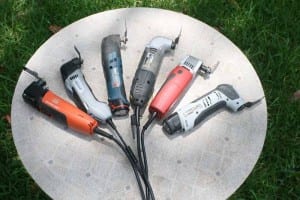 Build quality varied greatly from tool to tool. There’s a lot to talk about. Tools like the Dremel Multi-Max and Craftsman Nextec Multi-Tool were a breeze to hold one-handed and were light enough that even extended use overhead wouldn’t pose an issue. Other models, like the Rockwell SoniCrafter and the Fein were built like tanks and seemed perfectly suited for the professional jobsite, where dust and dirt and the occasional drop from a one-story roof might not mean the end of the tool. The Chicago Tools model suffered in the build quality here and really just came across as a cheap product – both in terms of its handling and the sound the motor put out (which reminded us of a vacuum cleaner, though it was only slightly off pitch from some of the others). Both the Craftsman Multi-Tool and the Rockwell SoniCrafter had a strange underlying metallic ring to their motors when they were turned on. I wasn’t sure if it was something indicating a rough bearing or if it was simply the ringing of the tool’s blade accessory. I assembled an interesting chart to outline some of the basic differences between the models in terms of their sound output, weight and motor noise.
Build quality varied greatly from tool to tool. There’s a lot to talk about. Tools like the Dremel Multi-Max and Craftsman Nextec Multi-Tool were a breeze to hold one-handed and were light enough that even extended use overhead wouldn’t pose an issue. Other models, like the Rockwell SoniCrafter and the Fein were built like tanks and seemed perfectly suited for the professional jobsite, where dust and dirt and the occasional drop from a one-story roof might not mean the end of the tool. The Chicago Tools model suffered in the build quality here and really just came across as a cheap product – both in terms of its handling and the sound the motor put out (which reminded us of a vacuum cleaner, though it was only slightly off pitch from some of the others). Both the Craftsman Multi-Tool and the Rockwell SoniCrafter had a strange underlying metallic ring to their motors when they were turned on. I wasn’t sure if it was something indicating a rough bearing or if it was simply the ringing of the tool’s blade accessory. I assembled an interesting chart to outline some of the basic differences between the models in terms of their sound output, weight and motor noise.
|
Weight |
Noise (SPL) |
Motor Tone |
|
| Craftsman Nextec Multi-Tool |
1 lb 14 oz |
86 dB |
High pitch; metallic ring |
| Milwaukee M12 Multi-tool |
2 lbs 3 oz |
87 dB |
Medium; saw-like; buzz |
| Bosch PS50-2A Multi-X |
2 lbs 2 oz |
84 dB |
Medium; saw-like; buzz |
| Fein MultiMaster |
3 lbs 4 oz |
95 dB |
Medium-high pitch; smooth |
| Dremel Multi-Max |
1 lb 12 oz |
92 dB |
Medium-high; smooth |
| Chicago Tools Multi-Function |
2 lbs 11 oz |
92 dB |
Vacuum cleaner |
| Chicago Tools Variable Speed |
3 lbs 11 oz |
91 dB |
Vacuum cleaner; metallic ball bearing ring |
| Rockwell SoniCrafter |
3 lbs 3 oz |
92 dB |
Medium-low; metallic ring |
While the above chart isn’t saying anything authoritative, it was interesting to note that the Fein was actually a few dB SPL louder than the others and that the cordless models had significantly less noise output than their tethered counterparts. It’s clear that if weight is a concern, the cordless models and the Dremel Multi-Max have a distinct advantage. The Dremel, in fact, was the lightest in the bunch and yet it seemed to still do very well in our subsequent cutting tests.
Check out our Best Cordless Oscillating Multi-Tools article
Motor noise was remarkably varied. Our only slight concern was with the slight metallic ringing that was present in the Rockwell SoniCrafter and the Craftsman Nextec 12V Multi-Tool. We’re pretty certain this sound wasn’t bearing-related and was simply the ringing of the accessory blade, however it wasn’t as smooth as most of the others. The Chicago Tools product simply sounded like a vacuum cleaner, which we thought was funny but wasn’t of any particular concern with respect to its performance as we saw later.
Best Build Quality: Fein MultiMaster and Rockwell Sonicrafter (2nd)
Storage and Accessories
Accessories ran the gamut for each of the tools, with some coming with tons and others opting for the minimalist approach – conceivably to reduce the overall cost of the tool. We quickly found, through repeated use and torture tests, that the accessories really make the tool. I’m not sure that manufacturers understand this, however. Since none of the tools really bogged down during our torture tests (pressure-treated lumber and old-growth heart pine boards) we quickly realized that the quality of the blade determined the cutting speed and overall satisfaction level of the tool in that area. Go figure. This made for some very funny (OK, so we have a weird sense of humor) results. We’ll talk more about cutting tests later.
Accessories also varied in both internal and external quality. By external we are referring to the use of either screen printing or laser etching on the surface of the blades. Dremel, Bosch (which more recent versions use the OIS Oscillating tool Interface System) and Craftsman all used laser etching and provided depth markings that didn’t scratch or rub off. Fein and Rockwell used some kind of screen printing that rubbed off just seconds after the blade was plunged into a piece of hardwood. The Chicago Tools blade, of course, looked like it had been stamped out of a piece of sheet metal, with no writing to be found anywhere (but of course it cut surprisingly well). Storage was also a concern and the tools ranged from having none (Chicago Tools) to sophisticated hard cases with multiple accessory storage compartments (Fein). For now, let’s examine the cases and accessories that come with each tool:
| Case |
Included Accessories
|
|
| Craftsman Nextec Multi-Tool |
Soft; undersized |
Wood/metal blade, sanding, scraper, grout removal, carbide rasp, drywall blade |
| Milwaukee M12 Multi-tool |
Soft tool bag |
Wood blade, sanding |
| Bosch PS50-2A Multi-X |
Hard w/accessories case |
Wood blade, sanding |
| Fein MultiMaster |
Hard; multiple |
Wood blade, sanding, scraper, grout removal, carbide rasp, drywall blade, profile sanding |
| Dremel Multi-Max |
Hard |
Wood blade, sanding, scraper, drywall blade |
| Chicago Tools Multi-Function |
None |
Wood blade, sanding, scraper, drywall blade |
| Rockwell SoniCrafter |
Soft tool bag |
Wood/metal blade, sanding, mini-sanding, scraper, grout removal, carbide rasp, drywall blade, polishing |
First off we have to say that the Craftsman Nextec 12V Multi-Tool has the worst case of the bunch. You pretty much should just toss it and buy a good quality zippered tool bag for use with this multi-tool. In order to use what they’ve provided you must remove the accessory (blade or sander) each time the tool is placed back in the case. Do this a few times and you’ll be as frustrated as we were. On top of the pile was the Fein, which had plenty of room for its 16 foot long cord and all of its included accessories (which it had the most of). There are two hard storage cases within the hard case of the Fein which offer perfect storage for the blades and sanding accessories (and this is basically how I divided them up). The Fein also came with a handy profile sanding system that allows you to match the profiles of many of the current wood siding existing in historic neighborhoods.
In terms of changing accessories, the Fein was again on top since it was the only oscillating multi-tool that offered tool-less accessory swapping. You didn’t have to worry about losing an Allen wrench or even a washer – the system was completely fool-proof. On the bottom of the pile we had the Chicago Tools Multi-Function tool which had a simple friction/washer system that felt any kind of detent or interlocking accessory would (apparently) be a waste of time… It was a nightmare to use and our first several times resulted in the accessory swinging loose after not much use. It inspired zero confidence and was a tragic mistake on the part of product development.
It surprised us that the Bosch and Dremel products didn’t share accessories – especially since they worked in such a similar manner (the diameter of the detents differ). In any case, the Fein, Dremel, Rockwell, and Craftsman are based upon proprietary accessories that don’t play well with others. Bosch provides a universal friction washer that allows the tool to use third party accessories (we tried it with several and it worked very well with no slippage). The Chicago Tools model is a plain washer system that apparently could work with nearly all accessories, but who in their right mind would buy accessories that typically cost almost as much as the tool itself when you can stick to the cheap ones at Harbor Freight?
Best storage: Fein MultiMaster and Bosch PS50-2 Multi-X
Most accessories: Fein MultiMaster, Rockwell SoniCrafter, Craftsman Nextec Multi-Tool
Performance Tests – It’s the Accessories, Stupid!
 The ability to do comparative testing was somewhat hampered by the lack of identical accessories across all of the tools. It was also at this stage where we quickly noted how important having good accessories could be – especially for wood flush-cutting. Take for example the cordless Bosch Multi-X tool. Using its own blade the system never once bogged down on us – the motor operated smoothly and the tool cut through hard wood (heart pine) at what we determined to be a medium speed. When we flipped out the accessory to the Dremel, however (because with this system we could), the tool cut just as fast as the Dremel. This led us to two conclusions. First, it’s the accessory that largely determines the speed and effectiveness of the tool. Second, most multi-tool manufacturers don’t understand this and view accessories either as cash cows (a profit-making category) or throw-ins that simply raise the price of the tool to consumers and must therefore be cost-controlled. We feel both approaches are incorrect. The accessories make the tool – they should be of high quality and they should not detract from the true potential of the oscillating tool. If you don’t have a good cutting blade, this is really just an expensive mouse sander – and that’s not what you’re buying.
The ability to do comparative testing was somewhat hampered by the lack of identical accessories across all of the tools. It was also at this stage where we quickly noted how important having good accessories could be – especially for wood flush-cutting. Take for example the cordless Bosch Multi-X tool. Using its own blade the system never once bogged down on us – the motor operated smoothly and the tool cut through hard wood (heart pine) at what we determined to be a medium speed. When we flipped out the accessory to the Dremel, however (because with this system we could), the tool cut just as fast as the Dremel. This led us to two conclusions. First, it’s the accessory that largely determines the speed and effectiveness of the tool. Second, most multi-tool manufacturers don’t understand this and view accessories either as cash cows (a profit-making category) or throw-ins that simply raise the price of the tool to consumers and must therefore be cost-controlled. We feel both approaches are incorrect. The accessories make the tool – they should be of high quality and they should not detract from the true potential of the oscillating tool. If you don’t have a good cutting blade, this is really just an expensive mouse sander – and that’s not what you’re buying.
The sanding attachments and included papers were satisfactory on most of the tools we tried. Some seemed to sand a little faster than others, but mostly this was based on the grit and differences between tools were minimal. Since not all tools included a drywall blade we didn’t get much mileage out of testing drywall cutting, though we’d suspect the previous discussion would again play a role – better blades equal better performance.
Fastest Cutting (Best Accessory Wood Blade): Fein MultiMaster, Dremel Multi-Max, Chicago Electric Multi-Function Tool
Round-up Conclusion
Each tool seemed to have its strengths and weaknesses, though we’re not about to tell you that there weren’t clear winners in various categories. And of course you can view the individual in-depth review of each of the tools here:
- Dremel Multi-Max Review
- Bosch PS50-2A 12V Multi-X Review
- Fein MultiMaster Top FMM 250Q Review
- Craftsman 12V Nextec Multi-Tool Review
- Chicago Electric Power Tools
Multi Tool Review - Rockwell SoniCrafter 72-piece Tool Review
To go through the roll-call we’d have to say that the Dremel Multi-Max was one of the best performers and had a tremendous value given its $99 retail price. It was fast, easily maneuverable and seemed perfect for non-professional use. It did not strike us as a tool you’d want to carry onto the job site and subject to any kind of serious shock or exposure. This is clearly the do-it-yourselfer’s choice.
The Bosch was the clear winner of the cordless models, though that is a lot like winning a race with only one other competitor. We also weren’t able to test Fein’s cord-free version which might give it a run for its money. It’s a durable tool that suffers mostly from an average wood-cutting blade and a surprisingly short battery life. Still, if you want cordless and you have the money – this is your tool.
Fein’s MultiMaster Top still holds the title – which we find extremely funny considering the other companies should have had years to plan on leapfrogging them (what were they doing while the patent was expiring)? The Fein is a solid performer, its build quality is superb and the whole package is polished and well-stocked (in accessories). The downside, of course, is price. It’s priced at over 2x the nearest competition. If you want the best, buy the Fein – it can be used on the jobsite and now has a space in one of our reference tool kits.
The Rockwell SoniCrafter is the workhorse of the bunch, but its cutting speed was middle-of-the-road (about equal to the cordless Bosch Multi-X). This is a tool you can throw in your truck and bring to the construction job. It feels like it will take some abuse and it’s a good two-handed tool for really getting in there and cutting. The large amount of accessories is impressive, though we heartily recommend you pick up a Standard End-cut Blade for $14.99 which will invariably provide much better performance with hardwood and plunge-cutting. For corded tools that can take a beating, this would be our choice for those who can’t pony up the dough for the Fein.
Craftsman’s 12V Nextec Multi-Tool was a bit of a disappointment. It’s got some great features like a decent battery life and an integrated LED work light. It was the slowest tool for cutting, however, and we didn’t see many options (online at least) for purchasing better accessories (just replacements at $12.99 a pop). This tool remains the least expensive cordless multi-tool, however and so it does have a draw for those who demand no tethering and aren’t taking on large projects. At $99 it’s got a lot going for it, though the Dremel Multi-Max will smoke it in terms of accessory convenience and performance.
The Chicago Electric Tools Multi-Function tool wins the award for longest, most boring name. It has the worst accessory system out there, sounds like a vacuum cleaner and doesn’t include a case. It’s boxy, feels cheap and will probably do a fantastic job if you don’t abuse it. For under $40 it’s really hard to resist not picking this up if you don’t plan on using it a lot. With one of those 20% off coupons I see at Harbor Freight every other week you can go through two or three of them before you hit the price of the Dremel. Mark my words, the other options are far more refined and sophisticated – and we don’t think the Chicago Electric tool will stand the test of time, but it’s a definite consideration if you’ve only got one job in mind and want a near-disposable solution.
Well that about sums it up. We came… we saw… you get the idea. If you’re shopping for an oscillating multi-tool we hope that this shootout article will give you enough guidance to make a solid decision based on your needs. It all comes down to budget and intended use. Will you be taking this on the job for years to come, or are you a casual user? Do you have a lot of money to spend on the best tool, or do you need to keep costs as low as you can? Do you need a corded or cordless solution? Consider your situation carefully and choose. No matter what you’ll be in for a treat as these are some of the most unique tools you will find.

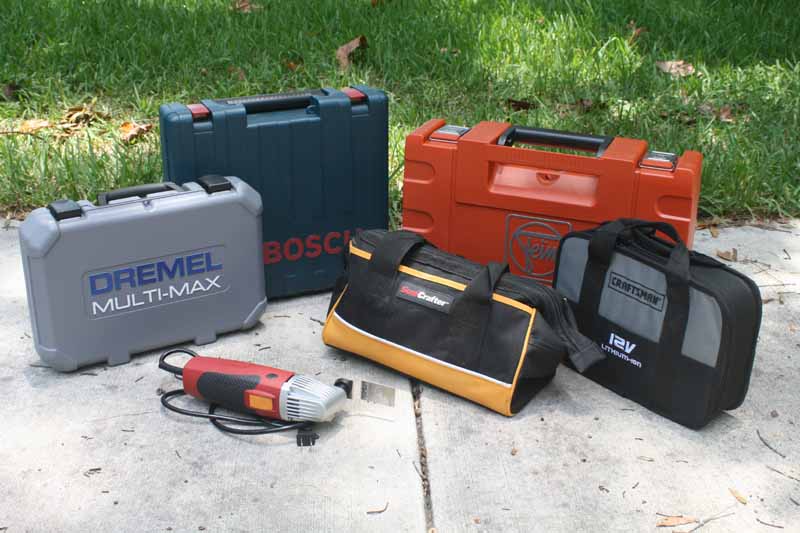
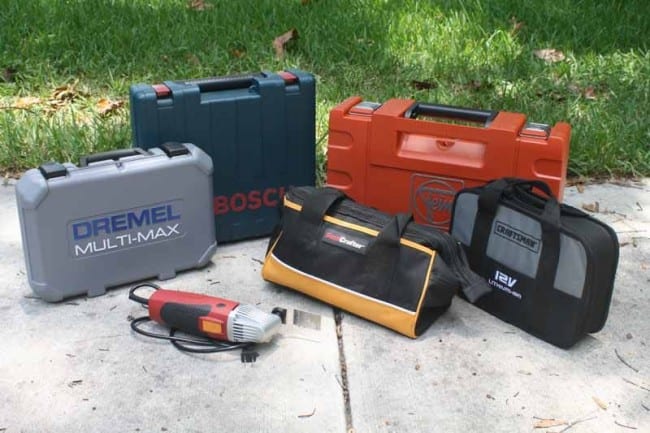
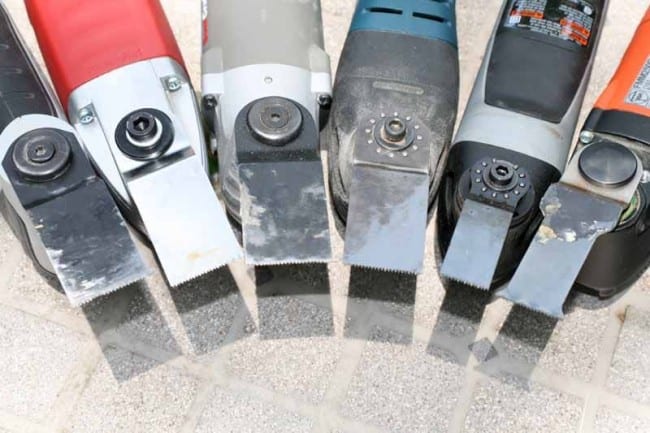
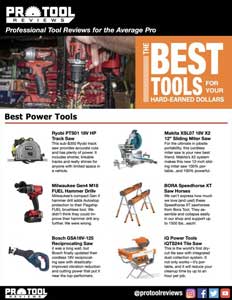

I had a Dremell a few years back did a few jobs, cutting some hardwood flooring, only lasted about a year. Cheap light weight junk that will not last for professional use. Bought a Chicago Electric from Habor Freight for $20 it is heavy, very loud, a pain in the neck to change blades (that sometimes come loose) but it cuts good, is powerful and has lasted about 5 years so far with a lot of abuse.
Pro cons
Very nice review, thanks! Helped me a lot to make my choice.
That is a swift look at what’s coming in 2014.
How right you are about the accessories. I bought one of the Chicago Tool units. I needed to do some sanding. All the sanding attachments are plastic. In fact almost all of them on the market are. The gearbox on the Chicago Tool unit gets so hot after only a short while, the heat conducted down the shaft melts the attachment for the sanding pad. This isn’t a problem that is correctable. Tool is going back. I’m also not convinced other tools won’t have the same problem.